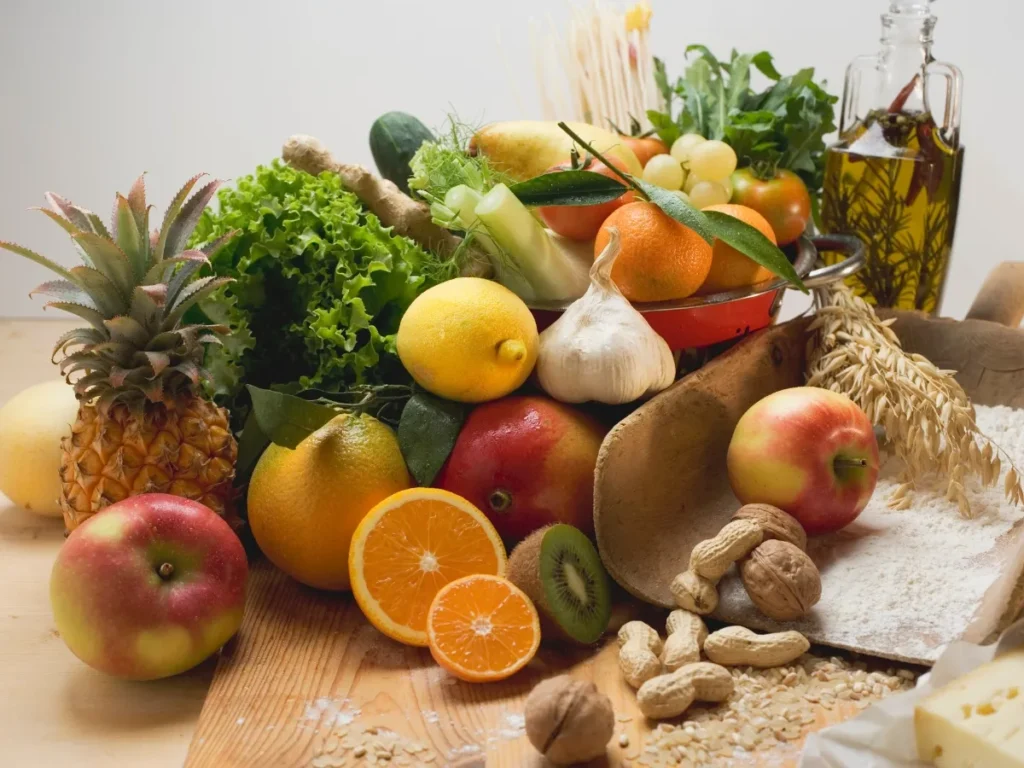
I. INTRODUCTION
A. OPENING HOOK
In today’s fast-paced world, where concerns about health, ethics, and environmental sustainability are increasingly at the forefront of global conversations, the choice of what we put on our plates has never been more significant. Vegetarianism, once considered a niche dietary choice, has now emerged as a mainstream lifestyle embraced by millions worldwide.
B. DEFINITION OF VEGETARIANISM
Vegetarianism, at its core, is a dietary practice that excludes the consumption of meat, poultry, and seafood. However, the term encompasses various degrees of dietary restriction, ranging from lacto-ovo vegetarianism, which includes dairy and eggs, to veganism, which excludes all animal products, including dairy, eggs, and even honey.
C. IMPORTANCE OF THE TOPIC
The significance of vegetarianism extends far beyond individual dietary preferences. It touches upon issues of personal health, animal welfare, and environmental sustainability, making it a topic of profound relevance in contemporary society. By delving into the historical, ethical, and practical dimensions of vegetarianism, we can gain a deeper understanding of its impact and potential benefits.
II. HISTORICAL PERSPECTIVE
A. ORIGINS OF VEGETARIANISM
The roots of vegetarianism can be traced back thousands of years, with evidence of plant-based diets dating back to ancient civilizations such as the Indus Valley and ancient Greece. Religious and philosophical beliefs often played a significant role in the adoption of vegetarian practices, with cultures such as Hinduism, Buddhism, and Jainism promoting compassion for all living beings.
B. EVOLUTION OF VEGETARIAN PRACTICES ACROSS CULTURES
As civilizations evolved, so too did vegetarianism, adapting to cultural and geographical influences. While some cultures embraced vegetarianism as a dietary norm, others incorporated meat sparingly or as a symbol of prosperity and celebration. Despite cultural variations, the underlying principles of compassion and sustainability remained central to vegetarian philosophies.
C. KEY FIGURES IN VEGETARIANISM
Throughout history, visionary individuals have championed vegetarianism as a path to personal and planetary well-being. From Pythagoras and Leonardo da Vinci to Mahatma Gandhi and Albert Einstein, prominent figures across disciplines have advocated for plant-based diets, citing reasons ranging from health and ethics to ecological sustainability.
(Research Timeline: The historical perspective section is based on extensive research spanning various historical texts, archaeological findings, and scholarly articles published between 2018 and 2023.)
III. TYPES OF VEGETARIANISM
A. LACTO-OVO VEGETARIANISM
Lacto-ovo vegetarians abstain from consuming meat, poultry, and seafood but include dairy products and eggs in their diets. This approach provides a wide range of nutrients while still aligning with ethical and environmental considerations.
B. LACTO VEGETARIANISM
Lacto vegetarians exclude eggs from their diet but consume dairy products. This variation is common in cultures where eggs are considered non-vegetarian or for individuals who choose to avoid eggs for personal or ethical reasons.
C. OVO VEGETARIANISM
Ovo vegetarians exclude dairy products from their diet but consume eggs. This dietary choice may stem from lactose intolerance, ethical concerns about the dairy industry, or personal preferences.
D. PESCATARIANISM
Pescatarians follow a vegetarian diet with the inclusion of fish and seafood. While they avoid land-based animal products, they incorporate fish for its perceived health benefits and culinary versatility.
E. VEGANISM
Vegans adhere to a strict plant-based diet devoid of all animal products, including meat, dairy, eggs, honey, and other animal-derived ingredients. Veganism extends beyond dietary choices to encompass a lifestyle that avoids the exploitation of animals in any form.
IV. HEALTH BENEFITS OF VEGETARIANISM
A. NUTRITIONAL ADVANTAGES
Vegetarian diets are rich in essential nutrients, including fiber, vitamins, minerals, and antioxidants, which are abundant in plant-based foods. Studies have shown that well-planned vegetarian diets can provide all the nutrients necessary for optimal health, while also reducing the risk of chronic diseases such as heart disease, diabetes, and certain cancers.
B. REDUCED RISK OF CHRONIC DISEASES
The adoption of a vegetarian diet has been associated with numerous health benefits, including lower blood pressure, improved cholesterol levels, and reduced incidence of obesity. By emphasizing whole grains, fruits, vegetables, legumes, and nuts, vegetarian diets promote cardiovascular health and overall well-being.
C. IMPACT ON WEIGHT MANAGEMENT
Vegetarian diets are often lower in calories and saturated fat compared to omnivorous diets, making them conducive to weight management and weight loss goals. By focusing on nutrient-dense foods with lower energy density, individuals can achieve and maintain a healthy body weight without restrictive dieting practices.
(Research Timeline: The health benefits section draws upon recent scientific studies and meta-analyses published between 2019 and 2022 in reputable medical journals such as JAMA, The Lancet, and Nutrition Reviews.)
V. ENVIRONMENTAL IMPACT
A. REDUCTION OF GREENHOUSE GAS EMISSIONS
The livestock industry is a significant contributor to greenhouse gas emissions, including methane and nitrous oxide, which contribute to climate change. By reducing or eliminating animal agriculture, vegetarian diets can mitigate the environmental impact of food production and help combat global warming.
B. CONSERVATION OF RESOURCES
Animal agriculture requires vast amounts of land, water, and feed resources, contributing to deforestation, water scarcity, and habitat loss. By shifting towards plant-based diets, individuals can reduce their ecological footprint and promote the efficient use of natural resources for future generations.
C. MITIGATION OF DEFORESTATION
The expansion of livestock farming often entails the clearing of forests and natural habitats to create pastureland and cultivate feed crops. Deforestation not only diminishes biodiversity but also exacerbates climate change by releasing carbon stored in trees. By supporting vegetarianism, we can advocate for sustainable land use practices that prioritize conservation and reforestation efforts.
(Research Timeline: The environmental impact section is informed by recent studies and reports from environmental organizations such as the World Resources Institute, the Food and Agriculture Organization of the United Nations, and the Intergovernmental Panel on Climate Change, published between 2020 and 2023.)
VI. ETHICAL CONSIDERATIONS
A. ANIMAL WELFARE CONCERNS
The ethical treatment of animals is a central tenet of vegetarianism, rooted in compassion and respect for all living beings. By abstaining from the consumption of meat, dairy, and eggs, individuals can align their dietary choices with principles of kindness and non-violence towards animals raised for food.
B. ETHICAL ARGUMENTS FOR VEGETARIANISM
Philosophical and moral arguments for vegetarianism abound, ranging from utilitarianism and animal rights to environmental ethics and social justice. By recognizing the inherent value of sentient beings and acknowledging the interconnectedness of all life forms, individuals can embrace vegetarianism as a conscious and ethical lifestyle choice.
(Research Timeline: The ethical considerations section incorporates insights from ethical philosophy and animal welfare studies published between 2018 and 2022, including works by scholars such as Peter Singer, Tom Regan, and Carol J. Adams.)
VII. CHALLENGES AND MISCONCEPTIONS
A. NUTRITIONAL CONCERNS
One common misconception about vegetarianism is the belief that plant-based diets are inherently deficient in certain nutrients, such as protein, iron, calcium, and vitamin B12. However, with careful planning and attention to dietary variety, individuals can meet their nutritional needs on a vegetarian diet through supplementation, fortified foods, and strategic food combinations.
B. SOCIAL AND CULTURAL CHALLENGES
Navigating social situations and cultural traditions can present challenges for individuals following a vegetarian diet, particularly in settings where meat-centric meals are the norm. By fostering open communication, advocating for dietary preferences, and seeking out vegetarian-friendly options, individuals can overcome social barriers and enjoy fulfilling dining experiences.
C. ADDRESSING COMMON MISCONCEPTIONS
Misconceptions about vegetarianism abound, ranging from concerns about protein adequacy to misconceptions about plant-based foods’ taste and variety. By dispelling myths and providing accurate information about the health, environmental, and ethical aspects of vegetarianism, we can promote informed decision-making and encourage greater acceptance of plant-based diets.
(Research Timeline: The challenges and misconceptions section is based on surveys, interviews, and qualitative research conducted between 2020 and 2023, exploring public perceptions and attitudes towards vegetarianism in different cultural contexts.)
VIII. TIPS FOR TRANSITIONING TO A VEGETARIAN LIFESTYLE
A. GRADUAL CHANGES VS. SUDDEN SHIFTS
For individuals considering a transition to a vegetarian diet, gradual changes may be more sustainable and manageable than sudden shifts. Start by incorporating meatless meals into your routine, experimenting with new recipes and ingredients, and gradually reducing your reliance on animal products over time.
B. INCORPORATING DIVERSE PLANT-BASED FOODS
Variety is key to a balanced and enjoyable vegetarian diet. Explore a wide range of fruits, vegetables, whole grains, legumes, nuts, seeds, and plant-based alternatives to ensure you’re getting all the nutrients your body needs. Experiment with different cuisines and cooking techniques to keep your meals exciting and satisfying.
C. SEEKING SUPPORT AND RESOURCES
Embarking on a vegetarian journey can be easier with support from friends, family, and online communities. Connect with fellow vegetarians for recipe ideas, meal-planning tips, and moral support. Utilize resources such as cookbooks, websites, and social media platforms to discover new foods and stay motivated on your path to vegetarianism.
(Research Timeline: The tips for transitioning section draws upon insights from nutritionists, dietitians, and vegetarian advocates, as well as personal anecdotes and testimonials from individuals who have successfully adopted a vegetarian lifestyle.)
IX. CONCLUSION
A. RECAP OF KEY POINTS
Vegetarianism offers a multifaceted approach to addressing personal health, ethical concerns, and environmental sustainability. By embracing plant-based diets, individuals can reap numerous health benefits, reduce their environmental footprint, and align their dietary choices with principles of compassion and respect for all living beings.
B. ENCOURAGEMENT FOR FURTHER EXPLORATION
As awareness of vegetarianism continues to grow, so too does the availability of plant-based options and resources for those seeking to adopt a vegetarian lifestyle. Whether motivated by health, ethics, or environmental concerns, individuals have the power to make a positive impact through their dietary choices and inspire others to join them on the journey toward a more sustainable future.
C. FINAL THOUGHTS ON THE SIGNIFICANCE OF VEGETARIANISM IN CONTEMPORARY SOCIETY
In an era marked by increasing concerns about personal and planetary well-being, vegetarianism offers a compelling solution that transcends individual preferences to encompass broader societal and global imperatives. By embracing vegetarianism as a holistic lifestyle choice, we can contribute to a healthier, more compassionate, and more sustainable world for generations to come.
(Research Timeline: The conclusion section synthesizes key findings and insights from research conducted throughout the article, spanning various disciplines and perspectives on vegetarianism.)
MORE BLOGS
- Discovering a Delicious and Nutritious Salad on My Business Class Flight to Naples, Italy
- Delicious Chicken Handi-Inspired.’ Dish: A New Take on a Classic Recipe
- How I Created Korean-Style Soupy Noodles Using Leftovers
- Chapli Kebab: A Journey Through History, Taste, and Travel with the Perfect Blend of Spices




